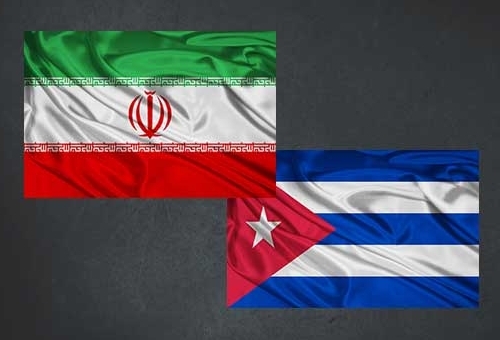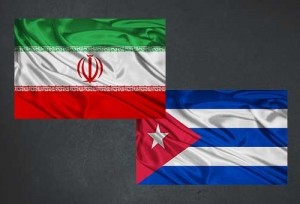Today on CBS: “Thousands of law enforcement officers in New York will spend July 4 trying to prevent a terror attack that could come from supporters of the Islamic State of Iraq and Syria (ISIS). NYPD Deputy Commissioner of Intelligence and Counterterrorism John Miller called it one of their biggest operations ever.
“I think if you look at history, they’re looking at big events, they’re looking at symbolic dates. They’re looking at military, police, intelligence,” Miller said Thursday on “CBS This Morning.”

CBS This Morning
FBI and Homeland Security warn of potential July 4th terror attacks
Federal authorities are urging local law enforcement to step up security and be vigilant ahead of the holiday weekend. CBS News senior security c…
CBS News senior security contributor Mike Morell said Monday the FBI and Department of Homeland Security’s warning of a potential July 4 attack is “nothing routine.” ”
This document is produced by the Majority Staff of the House Homeland Security Committee.
TOP TAKEAWAYS
• ISIS is dead set on attacking America and its allies. With the recent attacks in France and against tourists in Tunisia, ISIS has now been linked to 47 terrorist plots or attacks against the West, including 11 inside the United States. The rate of ISIS terror plots against the West has more than doubled in 2015 (19 plots in all of 2014; 28 already this year).
• The number of post-9/11 jihadi terror plots in the United States has surged. There have been more U.S.-based terror plots or attacks in the first half of 2015 (a total of 24) than in any full year since 9/11. Overall, homegrown jihadi plots have tripled in just the past five years (from 36 plots/attacks in June 2010 to 118 today).
• Islamist terrorists are getting better at recruiting Americans. Ten U.S.-based ISIS supporters have been arrested in the last month, bringing the total to 55 ISIS-inspired individuals arrested and charged in America (not including two who have been charged in absentia). ISIS followers have now been arrested in at least 19 states.
• Foreign fighters continue to pour into terrorist safe havens overseas—and represent a threat to the United States and its allies. More than 4,000 Westerners and 200+ Americans have traveled or attempted to travel to join Islamist terrorists in Syria, figures which have nearly doubled in the past year. Around 40 have already returned to the United States, according to authorities, one of which was arrested plotting a terrorist attack in Ohio.
• Islamist terror safe havens and franchises are proliferating rapidly, giving groups like ISIS and al Qaeda a base for operation and further expansion. Libya in particular has deteriorated quickly becoming a training ground for terror recruits. ISIS now has a direct presence, affiliates, or groups pledging support in at least 18 countries or territories, including Afghanistan, Algeria, Egypt, India, Indonesia, Iraq, Jordan, Libya, Lebanon, Nigeria, the Palestinian territories (Gaza), Pakistan, Philippines, Russia (North Caucasus region), Sudan, Syria, Tunisia, and Yemen.
TERROR PLOTS AGAINST THE WEST
ISIS is not a regional phenomenon but a global menace whose targeting against the West has surged in 2015.
By the numbers
• Since early 2014, there have been 47 planned or executed ISIS-linked terror plots against Western targets, including 11 inside in the United States.1
• There have been more ISIS-linked plots against Western targets in the first half of this year (28) than in all of 2014 (19).2
Recent Developments
• June 27: ISIS recruiter and computer hacker Junaid Hussain attempted to enlist a trainee to target the Armed Forces Day parade in London, England, in a bombing attack. Hussain is suspected to have been in social media contact with at least one of the perpetrators of the May 2015 attack on a Muhammad cartoon contest in Garland, Texas.
• June 26: Yassine Salhi, 35, decapitated his employer and attempted to blow up an American chemical company’s factory near Lyon, France, before being subdued. He had previously been under French authorities’ scrutiny over his jihadist ties. Salhi maintained regular contact with and sent pictures of the decapitated body to a Syria-based French citizen reportedly fighting for and in contact with ISIS leaders.
• June 26: Seifeddine Rezgui, 23, attacked a public beach and luxury resort complex frequented by Western tourists in Sousse, Tunisia, killing 39 individuals. He was eventually shot by security 1 forces. ISIS claimed responsibility for the attack. Tunisian officials believe Rezgui attended the same terror training camp in Libya as the attackers who targeted the National Bardo Museum in Tunis in March. This figure is based on open-source data compiled by the Majority Staff of the Homeland Security Committee.
2 This figure is based on open-source data compiled by the Majority Staff of the Homeland Security Committee.
• June 23: ISIS spokesman Abu Muhammad al Adnani issued an aggressive call urging followers around the world to launch terror attacks and turn the month of Ramadan (June 17 – July 17) into a “calamity for the infidels…Shi’ites and apostate Muslims.” Adnani proclaimed that martyrdom during Ramadan would bring “tenfold” rewards to jihadists.
• June 19: Justin Nolan, a 19-year-old from Morganton, North Carolina, was arrested for plotting assassinations and a large terror attack on behalf of ISIS using a semi-automatic AR-15 rifle. Nolan expressed his support for ISIS, acquired a gun silencer, desired to kill “as many as 1,000 people,” and planned to send footage of an attack to ISIS.
• June 17: Fareed Mumuni was arrested after attempting to stab FBI agents searching his home in connection with an investigation stemming from the arrest of Munther Saleh. Authorities believe Mumuni conspired with Saleh to construct a pressure-cooker bomb, similar to those used in the Boston Marathon bombing in 2013. Mumuni told federal investigators that he pledged allegiance to ISIS, planned to travel to ISIS-controlled territories to join the group, and intended to attack law enforcement officers if his efforts to join ISIS failed.
• June 16: Abdul Malik Abdul Kareem was indicted for providing weapons to Elton Simpson and Nadir Soofi for use in May 2015 Garland, Texas attack. Kareem also traveled with Simpson and Soofi to a remote desert area near Phoenix to practice shooting. He was charged with conspiracy, making false statements and interstate transportation of firearms with intent to commit a felony. The indictment noted that the three men “and others known and unknown to the grand jury” plotted the attack.
• June 13: Munther Omar Saleh, a 20-year-old college student, was arrested after he and an unidentified co-conspirator ran towards an undercover law enforcement car near the Whitestone Bridge in New York. Saleh came under scrutiny after a Port Authority police officer saw him walking near the George Washington Bridge in New Jersey this past March. Saleh conducted online research on preparing explosive devices— including research on pressure cooker bombs and other weaponry— in the New York metropolitan area on behalf of ISIS. Saleh was active on Twitter and tweeted his concern that al Qaeda was becoming “too moderate” in 2014. He also espoused pro-ISIS sympathies online and endorsed the Charlie Hebdo massacre in France and the Garland, Texas shooting attack.
• June 2: Ussamah Abdullah Rahim of Roslindale, Massachusetts, was initially planning to behead an individual at some point in the future but advanced the timing of his plot and changed the target to law enforcement personnel. Rahim attacked Boston police officers and FBI agents who were attempting to question him before being neutralized. He was radicalized by ISIS and had been on authorities’ radar for several years. His nephew, David Wright, conspired with Rahim and was initially arrested for obstructing the investigation. A third associate, Nicholas Rovinski from Warwick, Rhode Island, also in contact with ISIS recruiters overseas, was arrested June 11th and charged as a co-conspirator.
HOMEGROWN ISLAMIST EXTREMISM
Homegrown terror has reached unprecedented levels as extremist groups work to infiltrate the United States and remotely recruit and radicalize Americans.
By the numbers
• Since September 11, 2001, there have been 118 U.S. terrorist cases involving homegrown violent jihadists. Over 80 percent of these cases, which include plotted attacks and attempts to join foreign terrorist organizations, have occurred or been discovered since 2009.3
• Authorities have arrested or charged at least 44 individuals in the United States this year – 57 since
2014 – in ISIS-related cases. The cases involve individuals: plotting attacks; attempting to travel to Syria; sending money, equipment and weapons to terrorists; falsifying statements to federal authorities; and failing to report a felony.4
• FBI Director James Comey has said authorities have hundreds of open investigations of potential ISIS-inspired extremists that cover all 56 of the bureau’s field offices in all 50 states. He stated there may be hundreds or thousands of Americans who are taking in recruitment propaganda over social media applications: “It’s like the devil sitting on their shoulders, saying ‘kill, kill, kill.’”
Recent Developments
• Ten ISIS supporters were arrested in the United States in June, including individuals listed in the previous section tied to ISIS-linked plots or attacks against the West, including David Wright (MA),
Nicholas Rovinski (RI), Abdul Malik Abdul Kareem (AZ), Akmal Zakirov (NY), Munther Omar Saleh (NY), and Fareed Mumuni (NY). Other arrestees include:
• June 29: Alaa Saadeh, a 23-year-old from West New York, New Jersey, was arrested in connection with his involvement with an ISIS-supporting cell in New York and New Jersey. Saadeh intended to travel to join ISIS and previously assisted his brother in going overseas for the same purpose.
• June 19: Amir Said Abdul Rahman al Ghazi (previously Robert McCollum), a 38-year-old from Sheffield Lake, Ohio, was arrested after pledging support to ISIS, attempting to persuade individuals to join ISIS, expressing a desire to launch terror attacks, attempting to purchase an AK-47, and selling marijuana. Ghazi expressed his radical views through social media tools, including Facebook,
Twitter, and Google+.
• June 18: Samuel Rahamin Topaz, a resident of Fort Lee, New Jersey was arrested for his intent to travel abroad to join ISIS in Syria and for providing material support to the terror group. Topaz was a friend and coconspirator of Munther Saleh, arrested June 13. The two watched ISIS propaganda 3 This figure is based on open-source data compiled by the Congressional Research Service and the Majority Staff of the Homeland Security Committee. 4 This figure is based on open-source data compiled by the Majority Staff of the Homeland Security Committee. videos online depicting beheadings and discussed their plans to fight with ISIS by transiting different countries to ISIS-controlled territory in Syria.
• June 11: Ali Shukri Amin, 17, of Manassas, Virginia, pleaded guilty to charges of conspiring to provide material support to ISIS after facilitating the travel of Reza Niknejad to Syria to join the group in January. Amin’s Twitter account, which at one time counted more than 4,000 followers, provided advice and encouragement to ISIS and its supporters, including instructions on how to use virtual currency Bitcoin to raise funds for the terror group.
FOREIGN FIGHTERS
Jihadists are flocking to overseas battlefields unabated, acquiring terror connections and capabilities and representing a near-term threat to their home countries, including the United States.
By the numbers
• More than 22,000 fighters from 100 countries have traveled to Syria and Iraq to join extremists—the largest convergence of Islamist terrorists in world history. The number of foreign fighters who have traveled to battlefields globally exceeds 25,000.
• Approximately 4,000 Western fighters have traveled to Syria and Iraq.5
• An estimated 550 Western women have traveled to the conflict zone.
• More than 200 Americans are estimated to have traveled – or attempted to travel – to Syria to fight.
This figure is up 33 percent from the beginning of 2015.
• Around 40 American fighters who traveled to Syria have returned to the United States as of March 2015.
• In addition to fighters joining Sunni extremist groups like ISIS and Jabhat al Nusrah in Syria, an estimated 5,000-7,000 Lebanese Hezbollah members and other Shi’a militants are fighting alongside the Bashar al Assad regime.
• A senior State Department official said almost all foreign fighters are still entering Syria through Turkey.
• France continues to be the top European source for fighters joining extremists in Syria (~1,200).
French authorities estimate that nearly 500 French fighters are currently in Syria and Iraq. The top overall source for foreign fighters is Tunisia (~ 3,000).
FOREIGN JIHADIST NETWORKS & SAFE HAVENS
5
National Counterterrorism Center Deputy Director John Mulligan, testimony before the House Homeland Security
Committee, June 3, 2015.
Islamist terror groups are carving our greater sanctuary across the Middle East. ISIS is accelerating its global expansion while al Qaeda deepens its roots in the region.
By the numbers
• ISIS now has a direct presence, affiliates, or groups pledging support in at least 18 countries or territories, including Afghanistan, Algeria, Egypt, India, Indonesia, Iraq, Jordan, Libya, Lebanon, Nigeria, the Palestinian territories (Gaza), Pakistan, Philippines, Russia (North Caucasus region), Sudan, Syria, Tunisia, and Yemen.6
• ISIS controls 11 cities in Iraq and 10 cities in Syria as of late June.7
Recent Developments
• ISIS lost control of Tel Abyad, Syria, to Syrian Kurdish and Free Syrian Army-linked forces. The border town had served as a key ISIS line of communication from Turkey to its northern Syrian stronghold of Raqqa. ISIS has been launching counter-attacks against the border town.
• ISIS has maintained control of Ramadi, the capital of Iraq’s largely Sunni-populated Anbar province along the Syrian border, after seizing it in May. It is preparing to defend the area by digging trenches and emplacing improvised explosive devices, among other tactics.
• ISIS-affiliated militants have been consolidating control in and around Sirte, Libya. ISIS was recently pushed out of the coastal city of Darnah, which was at one point the top source of foreign fighters for al Qaeda in Iraq (AQI), ISIS’s predecessor. An estimated 3,000 fighters in Libya are aligned with ISIS. ISIS has reportedly sent fighters in Libya funding and military trainers over the last several months. The terrorists who separately attacked the National Bardo Museum and a coastal resort in Tunisia this year reportedly attended training camps in Libya.
• ISIS formally accepted a pledge of allegiance from followers in Russia’s North Caucasus region. As many as 2,500 fighters from this region have joined extremists in Syria and Iraq.
• Al Qaeda in the Arabian Peninsula (AQAP) has been forging alliances with and co-opting local Sunni tribes in southern Yemen since it defeated Yemeni security forces there in April. A recent prison break in Taiz, Yemen, reportedly freed more than 1,200 prisoners, including suspected AQAP militants.
• AQAP leader Nasir al Wuhayshi was killed in a targeted strike in Yemen. Wuhayshi served as deputy to al Qaeda leader Ayman al Zawahiri and helped build AQAP following a 2006 prison break. AQAP military commander Qasim al Raymi has been named his successor.
6 Data compiled by the Majority Staff of the Homeland Security Committee.
7
These figures are derived from assessments of territorial control conducted by the Institute for the Study of War.
• Al Qaeda’s affiliate in Syria, Jabhat al Nusra, is a prominent force in the anti-Assad regime coalition – supported by Qatar, Turkey, and Saudi Arabia – that has captured Idlib and other areas in northern Syria since March.
• A cell of veteran al Qaeda operatives in Syria plotting external attacks (Khorasan Group) has maintained a presence in northwest Syria, where U.S. and coalition forces targeted buildings and training camps associated with it in May.
OTHER DEVELOPMENTS
ISIS aggressively exploits social media in order to recruit fighters, disseminate propaganda, and trigger attacks in the West.
• Since the beginning of this year, ISIS has pushed out more than 1,700 “products,” including videos, photographic reports, and magazines over social media.8
• There are an estimated 200,000 pro-ISIS messages posted on Twitter every day.
• ISIS released the 9th issue of its English-language magazine “Dabiq” in May. The articles praises the attackers who targeted the Garland, Texas, cartoon contest, exhorts followers to commit terrorist acts in the United States and other Western countries, and touts the “benefits” it offers people living in its territory.
The risk of Islamist terrorists exploiting refugee and migrant flows to travel freely remains high as underscored in a recent arrest.
• Italian authorities arrested Abdel Majid Touil, a 22-year-old Moroccan terror suspect who arrived in Italy on a migrant boat and spent several months there. Touil is suspected of being part of the terror network behind the March National Bardo Museum attack in Tunisia.
• ISIS-aligned militants have been taxing migrant boat smugglers and using them to transport militants, according to a Libyan government adviser citing conversations with smugglers. Reports in 2014 indicated that ISIS operatives had discussed using refugee flows into Europe as a “Trojan Horse” for its operatives. Italian officials have reportedly expressed concerns over terrorists’ potential exploitation of these flows.
The Obama Administration released additional detainees from Guantanamo Bay in June and is formulating a broader plan to shutter the facility.
• Defense Secretary Ashton Carter said he is working with the White House on a closure plan for Guantanamo to be submitted to Congress.
8
National Counterterrorism Center Deputy Director John Mulligan, testimony before the House Homeland Security
Committee, June 3, 2015.
• The Defense Department announced it transferred six al Qaeda detainees – several who reportedly served as bodyguards for Osama bin Laden – from Guantanamo to Oman. Almost 30 percent of released detainees from Guantanamo are known or suspected to have returned to the battlefield.
• The travel ban on the “Taliban Five” – freed in exchange for now-charged Sgt. Bowe Bergdahl – will remain in place temporarily. Restrictions enforced by the Qatari government were set to expire on June 1, 2015, but will now be extended until negotiations involving the U.S., Qatar, and Afghanistan are concluded.
Many more details in context here.



